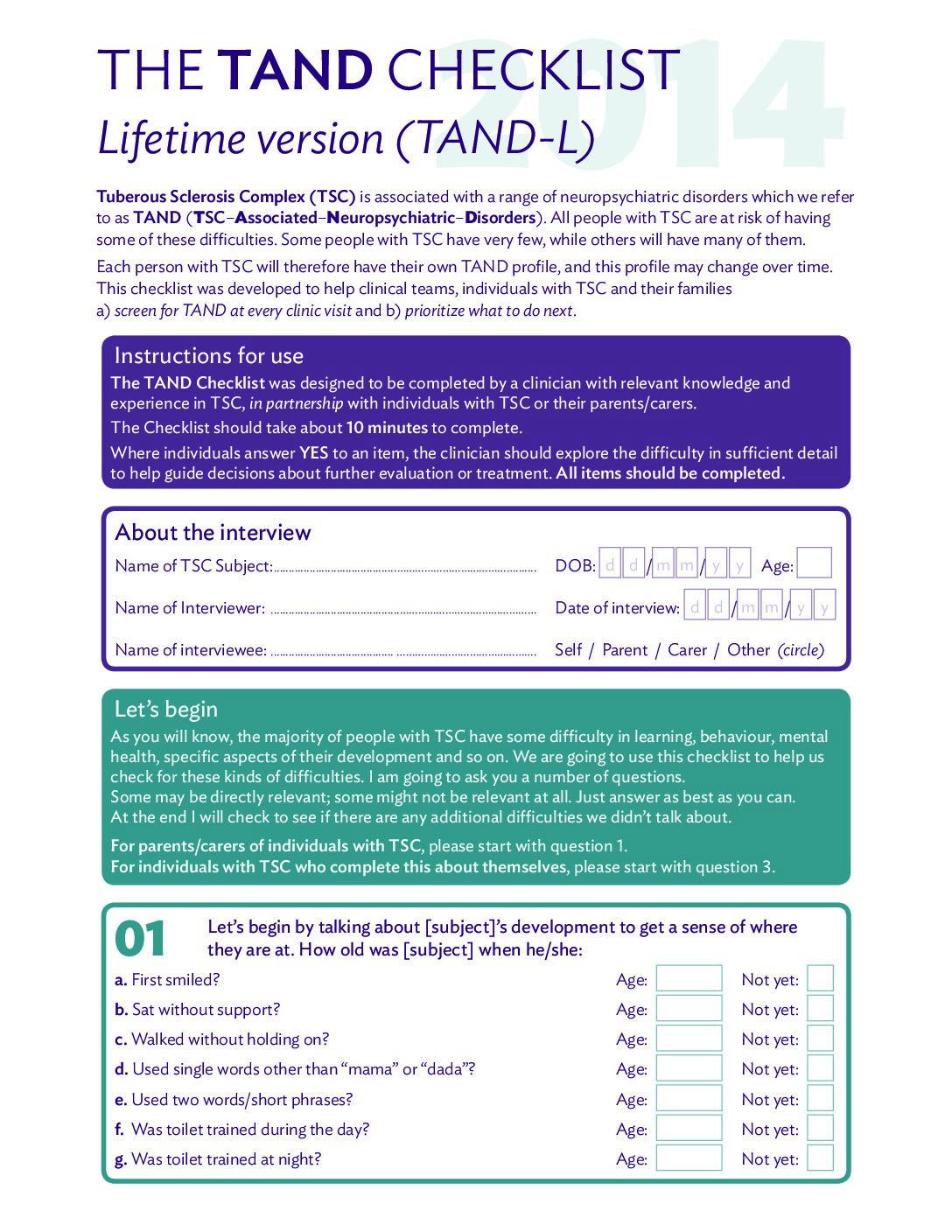TAND questionnaire analysis in Polish adults
*WARNING: This article mentions mental health and suicide*
About this study
Around 90% of people with TSC have symptoms of TSC-associated neuropsychiatric disorders, or TAND. To date there have been no studies which focus on TAND in adults living with TSC. The aim of this research was to study the needs and difficulties of this population, including the differences between those with or without epilepsy and intellectual disability.
Study methodology
The researchers conducted face-to-face interviews and used the Polish version of the TAND checklist to assess 100 adult participants living with TSC (48 males and 52 females).
71% of participants had epilepsy and 37% had an intellectual disability.
37 of the study participants had their checklists completed by a parent or caregiver, and 63 completed the checklist for themselves.
Outcomes of the study
Only 11% of the people interviewed had ever received screening for TAND in the past, and they were the people in the youngest age group (18-21 years old). Only 36% had ever had any sort of psychological/psychiatric evaluation. None had ever had a detailed neuropsychological assessment.
Among the surveyed individuals, the TAND symptom that was most frequently assessed was the challenge in completing school tasks, which was reported by 56% of respondents.
The researchers found that 89% of respondents had four or more TAND symptoms.
They found that people living with TSC who had an intellectual disability or epilepsy were more likely to have TAND symptoms than those without epilepsy.
The most common neuropsychiatric disorders in participants were autism spectrum disorder (ASD), depression, and anxiety. ASD was only found in the epilepsy group, and anxiety disorder was more often diagnosed in the epilepsy-free group. In the group with typical brain function, more people reported depression. Most respondents presented with several behavioural and cognitive problems.
Other issues not included in the TAND checklist were also mentioned by some of the people interviewed. Several people in the neurotypical group mentioned a fear of having children and feelings of guilt due to passing on the TSC gene. Half of the respondents in this group reported relationship problems (being separated, divorced or difficulties with intimate relationships). Other issues noted were sexual difficulties due to a fear of getting pregnant, as well as shame and stigma surrounding skin lesions.
The researchers noted that sexual education, particularly in the intellectually disabled group, was lacking, and that adding support from sexual education specialists may help with some of the needs in this group.
Respondents within the neurotypical group also noted employment difficulties due to concentration issues, and trouble finding employment due to epilepsy.
Alarmingly, 23% of subjects in the neurotypical group reported suicidal thoughts and 11% had attempted suicide (some had made multiple attempts).
Implications of the study
This study highlights that TAND is common in adults with TSC and is often underdiagnosed. The researchers concluded that TAND is one of the biggest issues affecting the quality of life of people with TSC, and that TAND screening should be made widely available to patients living with TSC.
The researchers concluded that, ‘…similar to the wide variety of physical symptoms, neuropsychiatric symptoms of TSC differ between patients; thus, each individual with TSC has their own unique TAND profile.’ Because of the changing nature of TAND symptoms, the researchers recommended that re-evaluation be done regularly.
Limitations of the study
The authors did not highlight any limitations with their study, however they did note limitations with the TAND questionnaire. In particular, they noted that it is difficult to accurately diagnose TAND due to how many different symptoms are covered, and the fact that these symptoms may arise in later life despite years without a diagnosis of TAND.
The researchers recommended detailed interviews be conducted with people living with TSC where TAND is suspected, and noted that these interviews should include discussion of family stress and relationship problems, which are not currently included in the TAND questionnaire.
Marcinkowska, A. B., Jóźwiak, S., Tarasewicz, A., Dębska-Ślizień, A., & Szurowska, E. (2022). Tuberous Sclerosis Complex Patients’ Needs and Difficulties—Results of TAND Questionnaire Analysis in Polish Adult Population, Journal of Clinical Medicine, 11(21), 6536.
Full article available at: https://doi.org/10.3390/jcm11216536
For more on TAND and the TAND questionnaire click here.
DISCLAIMER
This information is intended to provide some insights into recent TSC-related research. It is not intended to, and it should not, constitute medical or other advice. Readers are warned not to take any action without first seeking medical advice.

